

The Feministing Five: Melissa McEwan. If you read Feministing, it’s almost certain that you’ve heard of Melissa McEwan.
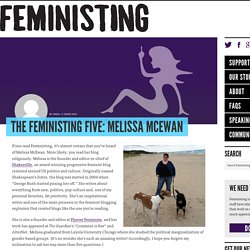
More likely, you read her blog religiously. Melissa is the founder and editor-in-chief of Shakesville, an award-winning progressive feminist blog centered around US politics and culture. Originally named Shakespeare’s Sister, the blog was started in 2004 when “George Bush started pissing her off.” She writes about everything from race, politics, pop culture and, one of my personal favorites, fat positivity. She’s an inspirational writer and one of the main pioneers in the feminist blogging explosion that created blogs like the one you’re reading. She is also a founder and editor at Flyover Feminism, and her work has appeared at The Guardian‘s “Comment is free” and AlterNet. All the Rebel Women: The rise of the fourth wave of feminism « Guardian Shorts.
This is an edited extract from Chapter 1 of All the Rebel Women One evening when Jinan Younis was 16, a man began following her around a sprawling, deserted shopping centre in Manchester. This turned into a chase. Every time she looked around, he was there, until she was running up escalators as fast as she could to get away. She finally escaped, but the experience was frightening, and she was struck by the unfairness, a man feeling he had a right to threaten her, to infringe on her freedom. Her anger rose when she told other people. Auteuse theory: a blog on women's cinema.
Anti-Sexist Activist, Speaker, Author, Film-maker. Read 12 Masterful Essays by Joan Didion for Free Online, Spanning Her Career From 1965 to 2013. In a classic essay of Joan Didion’s, “Goodbye to All That,” the novelist and writer breaks into her narrative—not for the first or last time—to prod her reader.
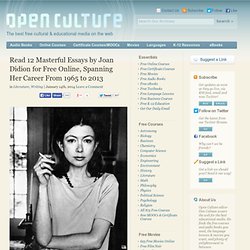
She rhetorically asks and answers: “…was anyone ever so young? I am here to tell you that someone was.” The wry little moment is perfectly indicative of Didion’s unsparingly ironic critical voice. Didion is a consumate critic, from Greek kritēs, “a judge.” But she is always foremost a judge of herself. I want to explain to you, and in the process perhaps to myself, why I no longer live in New York. Anyone who has ever loved and left New York—or any life-altering city—will know the pangs of resignation Didion captures.
The essay appears in 1967’s Slouching Toward Bethlehem, a representative text of the literary nonfiction of the sixties alongside the work of John McPhee, Terry Southern, Tom Wolfe, and Hunter S. And yet she is perhaps best known for her work in the genre. It’s a curious statement. “John Wayne: A Love Song” (1965) Western intersectional feminists: we need to talk. (Author’s note: I feel a little weary of the heading of this article, mainly because I'm not too sure whether people might consider me a Western intersectional feminist or not.
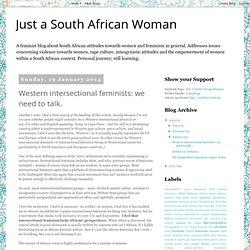
I'm white and English-speaking, living in Cape Town – but I'm still in a developing country which is underrepresented in Western pop culture, news culture, and social movements. I don’t even like the term, ‘Western’, as it actually usually represents the US and Europe, which is not the entire geographical west. So what I mean by ‘Western intersectional feminists’ is ‘intersectional feminists living in Westernized countries’, particularly in North American and European countries.) One of the most defining aspects of the ‘wave’ of feminism we’re currently experiencing is inclusiveness. African Feminism. Afrikan feminist musings and reflections. Feminism is alive and well. The work of Laurie Penny. Feminist Frequency.
Bell hooks. Gloria Jean Watkins (born September 25, 1952), better known by her pen name Bell Hooks (stylized bell hooks),[1][2] is an American author, feminist, and social activist.
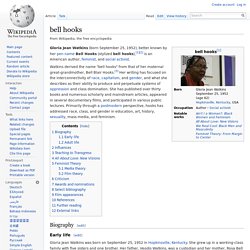
Biography[edit] Early life[edit] Adult life[edit] Her teaching career began in 1976 as an English professor and senior lecturer in Ethnic Studies at the University of Southern California. During her three years there, Golemics (Los Angeles) released her first published work, a chapbook of poems titled "And There We Wept" (1978), written under her pen name, "bell hooks". Ain't I a Woman? Since the publication of Ain't I a Woman? She is frequently cited by feminists[7][8][9] as having provided the best solution to the difficulty of defining something as diverse as "feminism", addressing the problem that if feminism can mean everything, it means nothing.
In 2002, hooks gave a commencement speech at Southwestern University. Hooks has undertaken three scholar-in-residences at The New School. Influences[edit] The 'MHP' Black Feminism Syllabus. Melissa Harris-Perry, 11/23/13, 1:39 PM ET Don't call first lady a ‘feminist nightmare’ Melissa Harris Perry reads her letter to Washington reporter Michelle Cottle, who called Michelle Obama a “feminist nightmare,” saying Cottle is wrong to write off the first lady’s priorities as fluff.
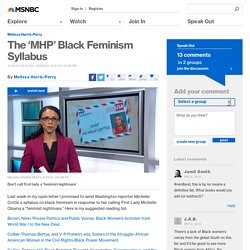
13 Must Reads For The Black Feminist In Training.